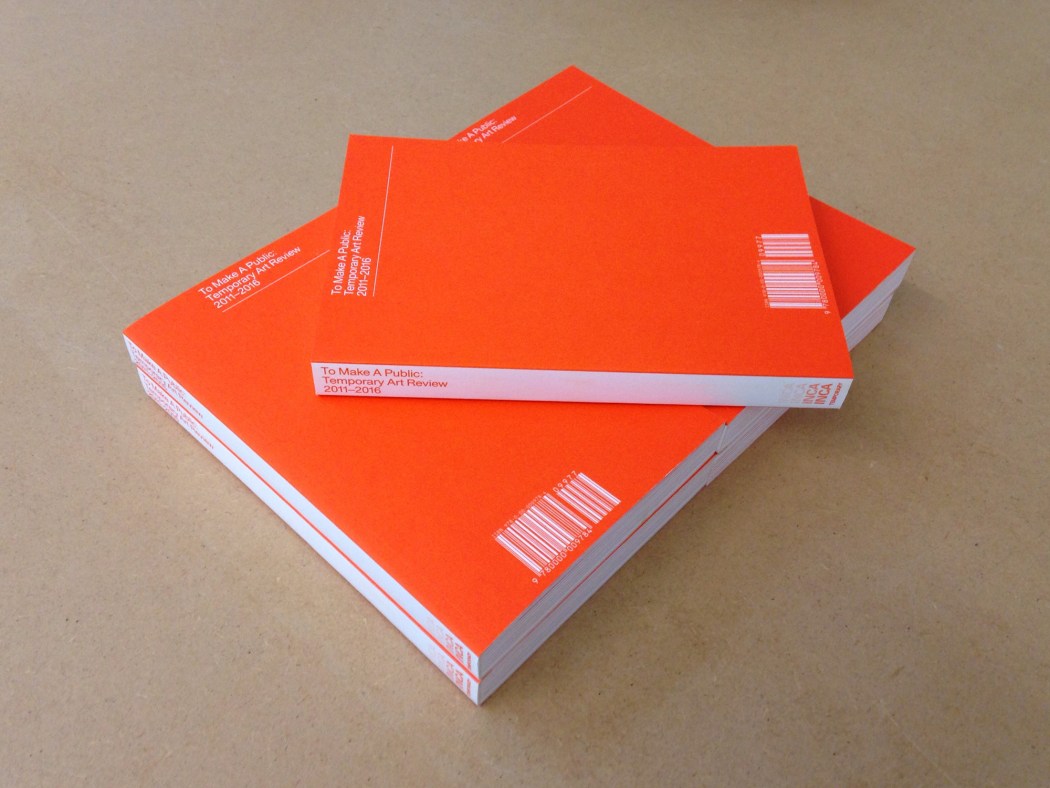A*Desk Interview by Mela Dávila Freire
May 2021

To Make a Public: Temporary Art Review 2011-2016, published by INCA Press.
As guest editor for the month of May, Mela Dávila Freire interviewed MARCH co-founders Sarrita Hunn and James McAnally for A*Desk, an international critical publishing platform based in Spain, as part of a series on survival strategies for independent art projects also including interviews with FelipaManuela in Madrid, Bulegoa zenbaki barik (z/b) in Bilbao, and BNV Producciones, one of Spain’s longest-running independent initiatives operating in Andalucía (Sevilla).
Mela Dávila Freire: What does “independent” mean for you?
Sarrita Hunn + James McAnally: Increasingly, I [James] have strayed away from the language of the independent space, curator, and so on. I have instead started describing myself as a dependent curator, emphasizing those interconnections that are essential to any work. No project is independent and even though that language formed as an attempt to assert an outside to dominant institutions and models, it feels more and more entrapped in their logics. For MARCH, we intentionally consider our collectivity – the ways in which we are all always multiple. In that, we are connected with numerous other publishers and publications, writers, and institutions both within the various parts of our “collective research group” and through other formal and informal collaborations.
Whether we start to think more about “dependent publications” or some other term, we are especially interested in what it means to take a position – to deny neutrality, or objectivity – and to form community around those positions. The connection of dependence and collectivity, and autonomy as a way to choose communal logics rather than a sense of solitary practice feel like more liberating expressions to start from.
Mela Dávila Freire: You have underlined the importance of artists’ publications and artists’ publishing as references which inspire much of your work. Besides this, did you have any other model or reference that inspired you or influenced the way in which you conceived Temporary Art Review and MARCH?
Sarrita Hunn + James McAnally: Artists’ publications, particularly from the 1960s to the present, offer a conceptual precedent for our work, as they expanded the idea of the publication as a site of exhibition, exchange, criticism and subjective, self-historicizing commentary, with radical potential for flattened distribution, circulation of ideas, and insertion of isolated narratives into a broader cultural sphere. Beyond historical models of artists’ publications, we really look at the present conditions of publishing and the forms of instituting in a self-critical sense. More than any external models, we have focused our attention on how to sustain an ethical and impactful publication that is global in scope. In many ways, there are not existing models for that (or at least none that fully map onto our work), so the impetus for us is to attempt to build one. We ask, “What is an urgent, ethical, sustainable form for publishing in the present?” and attempt to see that live in its many modes.
This is conversant with larger concepts of institutional critique’s urgent next phase being to actually form prefigurative institutions. We publish on this idea often as applied to museums, art spaces, biennials, informal or independent spaces, and so on, but also as it applies it to our own form and operations on a daily level. Attention to how money is sourced and distributed, how power is held and shared, whose viewpoints are privileged and made public, and so on: this is enough to go to start to arrive at a “model.” How collectives and cooperatives in and out of the arts operate; how protests form and sustain, and how they coalesce into organizations at times; how mutual aid networks are documented and distributed in print and online. The models are multiple and continuously incorporated for us.
The full interview is available on A*Desk in English, Spanish and Catalan.